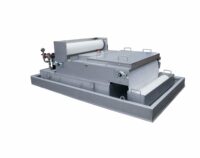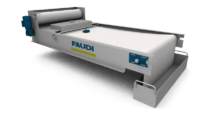Gravity belt filters
The optimum filtration technology for
thorough cleaning of liquids.


Optimise your efficiency and sustainability with our automatic gravity belt filters. Our filtration solution is versatile and can be used for separating solids from liquids, e.g.
Our gravity belt filters can be customised precisely to your application. They can be supplied for confined spaces or as a complete and fully automatic filter system, as well as in a stainless steel or steel version. Depending on the filter size and medium, filtration capacities of up to 1,500 l/min can be achieved. We will be happy to advise you on the best design for you.
By using our automatic gravity filters, you can extend the service life of your process fluids and close cycles. This saves costs and increases the environmental compatibility of your production. Our systems are also characterised by their robust design and very low maintenance requirements.
We set the highest standards for ourselves as a filter system manufacturer. Both in terms of the quality of filtration and the durability of our gravity filter systems. We also set high standards for our service: from planning and engineering to maintenance, we always offer you the best service.
The wide range of options allows us to cater to your specific requirements. FAUDI gravity belt filters can be installed on existing tanks or offered as complete systems with tanks, pumps, heating, cooling and control – conventional or with PLC. Our solutions also give you flexibility in terms of filtration performance.
We solve your filtration task – efficiently, economically and sustainably. Let us advise you now without any obligation.

The automatic gravity belt filter consists of a steel or stainless steel frame into which an endless carrier belt made of wire mesh is guided. This carrier belt is guided over a drive and deflection shaft with low wear and, together with the fibre fleece on top, forms a deep filter trough. The contaminated liquid flows smoothly into the filter trough via an inlet tray or an inlet box with guide plates/tangential separator.
Gravity causes the liquid to flow through the fibre fleece. Dirt particles are separated from the fibre fleece and a filter cake builds up. Finer and finer dirt particles are retained by this filter cake. The build-up of the filter cake gradually reduces the flow rate and the liquid level in the filter trough rises until the float switch switches on the belt feed. The contaminated fibre fleece is transported further and discharged into the sludge box. At the same time, new fibre fleece is drawn from the fleece roll into the filter trough, the liquid level drops and the belt feed is stopped. The process in the gravity filter starts again. Once cleaned, the liquid is available again for the machining process.
We will be happy to advise you on the best design for your gravity belt filter.




